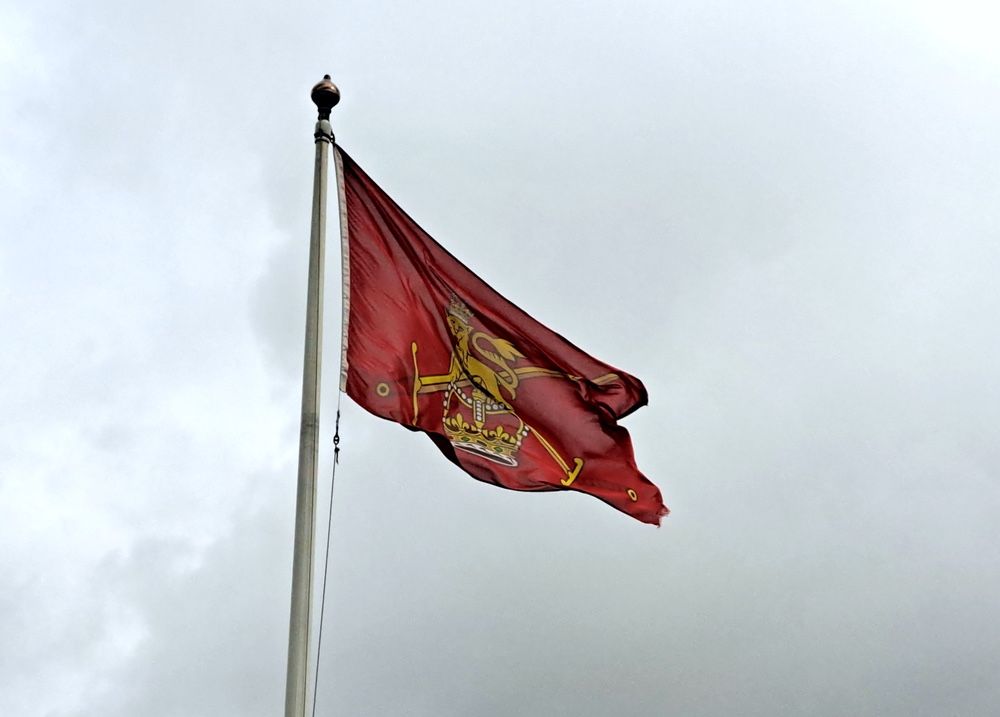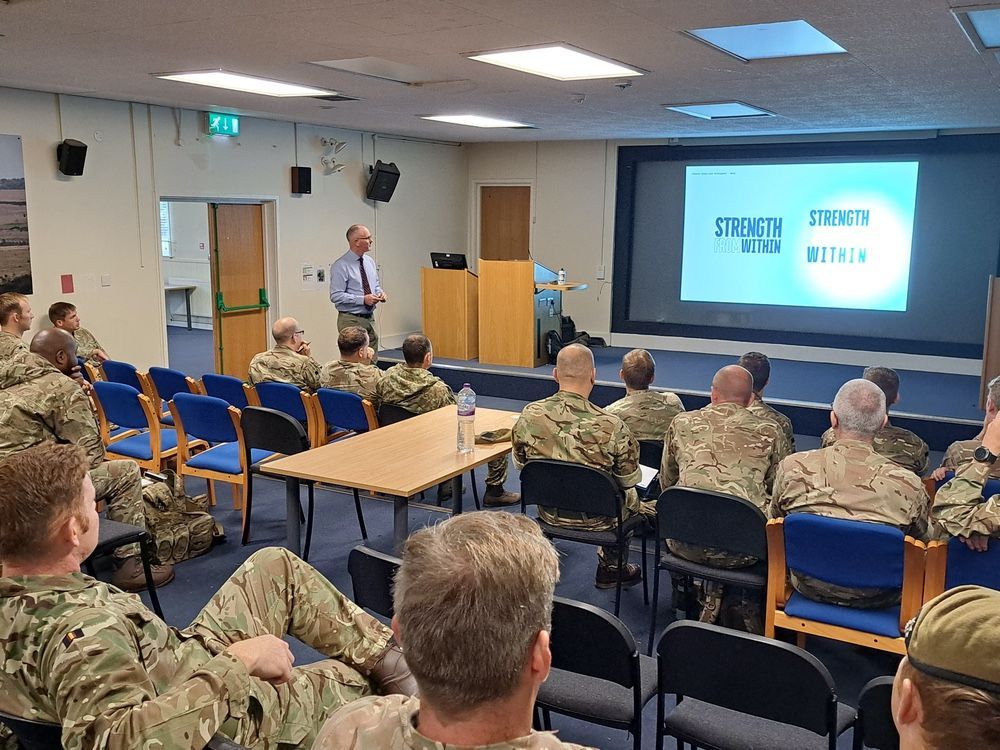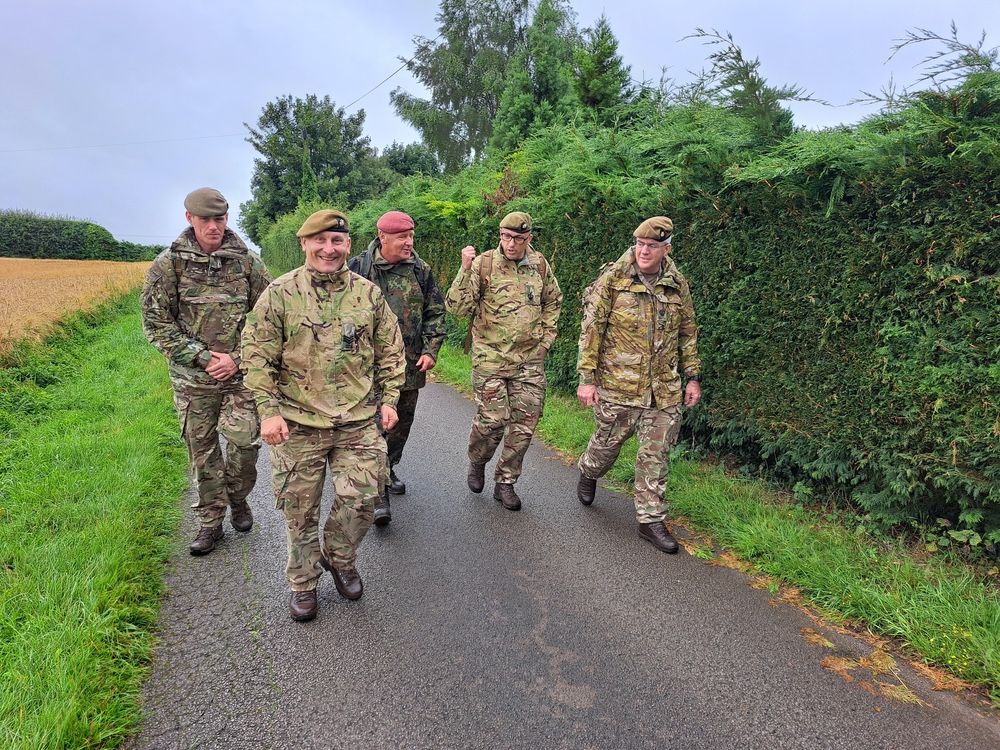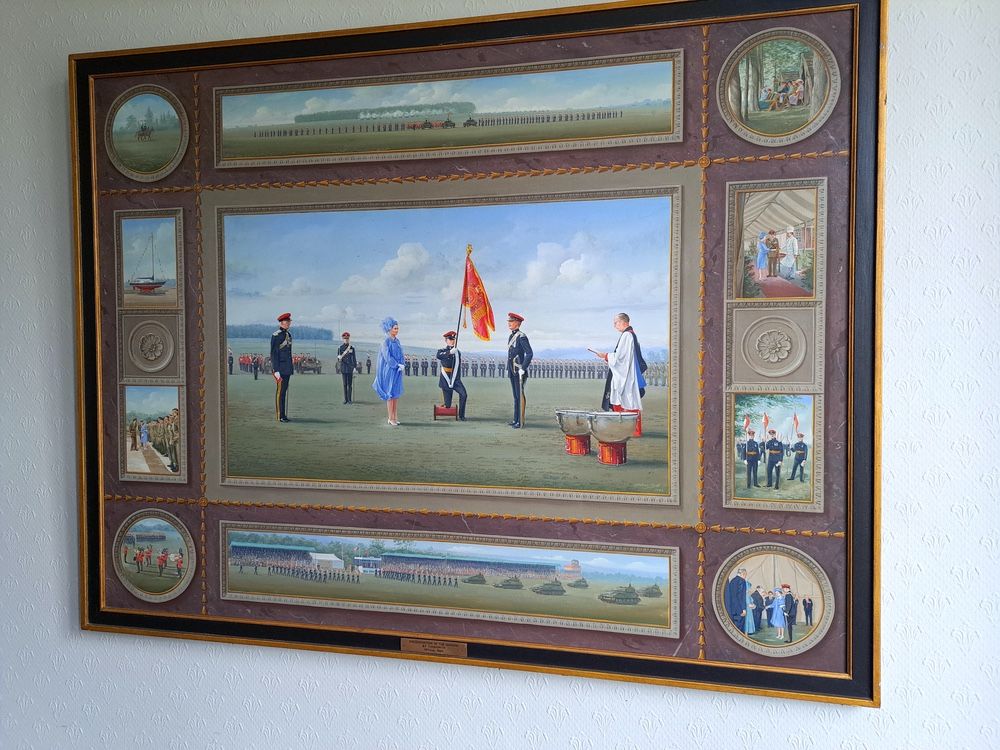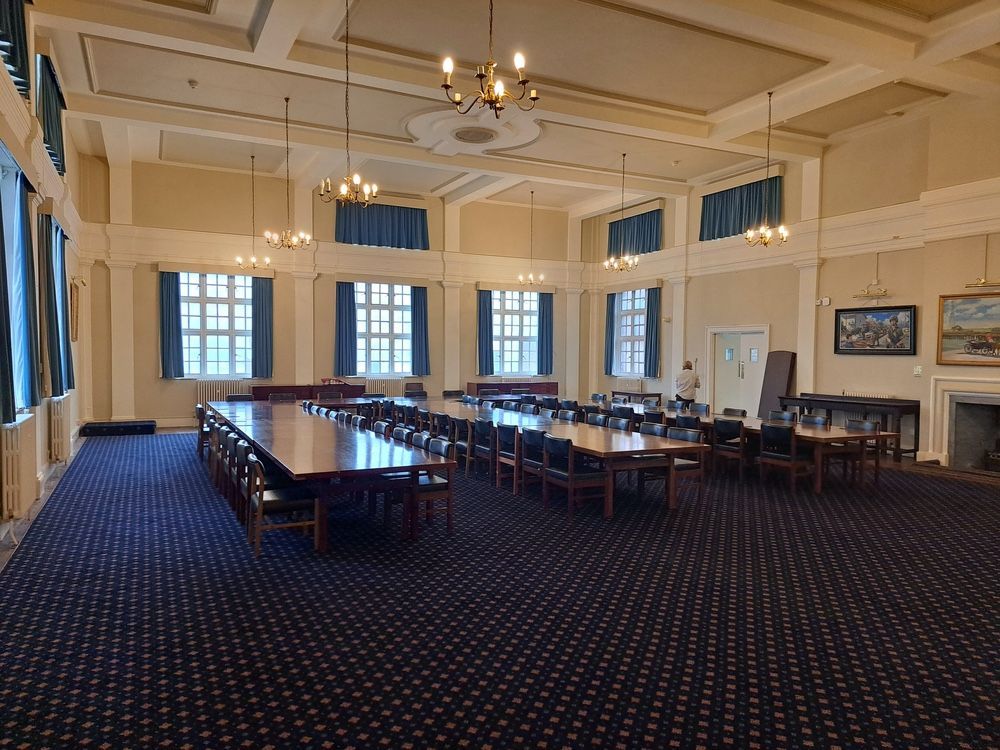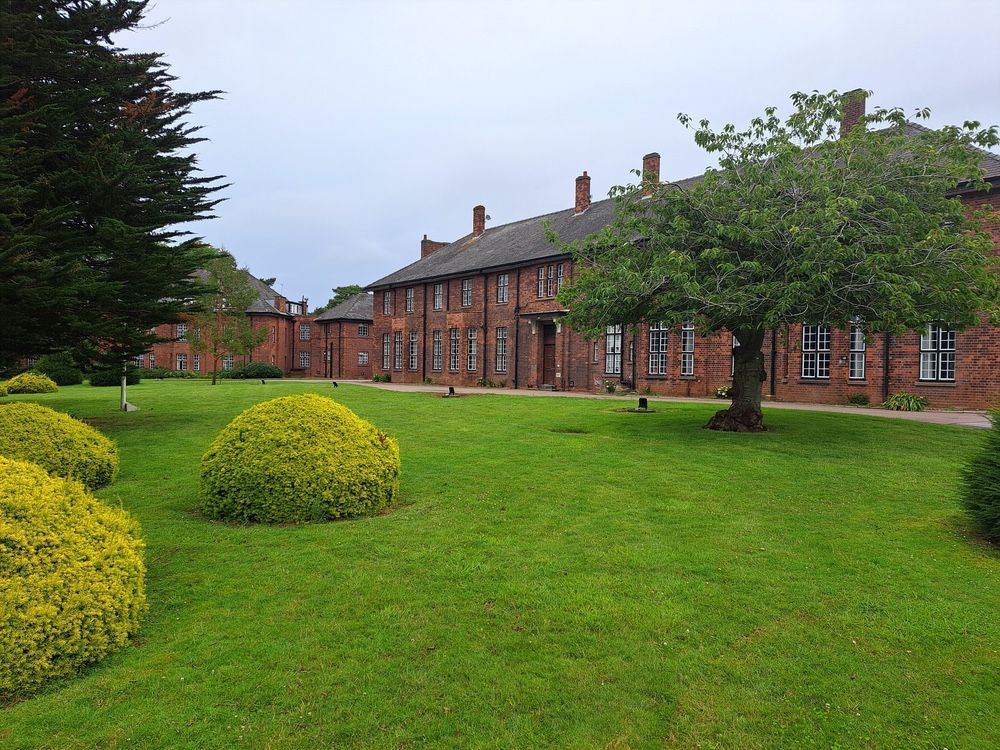Ein einmaliges Kulturerlebnis: Regimental Dinner in England, Juli 2023
„Combat estimate“ nennen die Briten ihren Entscheidungsfindungsprozess, der sich in „7 Questions“ gliedert. Die Parallelen sind offensichtlich, wenn auch manchmal versteckt. „Ich denke wir haben 80% Übereinstimmung und können fast aus dem Stand zusammenarbeiten“, sagt Leutnant B. und so zeigt es sich auch im Gelände. Nach einem halben Tag theoretischer Ausbildung und Wiederholung des „Combat estimate“ geht es hinaus ins Gelände. Ein britischer Sergeant weist in die Lage ein. Es gilt einen Feind in Gruppenstärke in einem Haus mit einem Zug zu werfen. Es regnet, natürlich. Die Weizenfelder stehen im Saft, hohe Hecken decken die Annäherung. Der Sergeant teilt vier Gruppen ein und verteilt die deutschen Soldaten auf alle. Zusammen entwirft jede Gruppe in 90 Minuten einen Angriffsplan und präsentiert diesen dann im strömenden Regen. Ausbildung auf hohen Niveau mit einfachsten Mitteln. „Get the job done. Diesen Satz hört man häufiger bei 3 Royal Anglian. Zurecht.“, sagt Oberstleutnant G., stellvertretender Kommandeur und S3 von Einsatz 1, „Ich bin beeindruckt von der professionellen Vorgehensweise der britischen Kameraden bei ihrer Ausbildung. Da können wir uns viel mitnehmen“. Oberstabsfeldwebel R. ergänzt: „Eins wurde mir hier klar: Wir können trotz unterschiedlicher SOPs (Standard Operating Procedures) im Führungsprozess zusammenarbeiten“.
Öffentlichkeitsarbeit und Markenentwicklung
Auch in der Öffentlichkeitsarbeit gleichen sich die Herausforderungen und Ansätze. Der Vortrag des britischen Major P. stellt viele Fragen, die sich Einsatz 1 auch stellt: Wie stellen wir uns dar, welchen Markenkern wollen wir nach außen transportieren, wie nutzen wir das Internet für Rekrutierung und Außendarstellung? Die Lösungsansätze gleichen sich: professionelles Auftreten im Internet, gute Berichterstattung auf vielen Kanälen und eine eindeutige, in sich konsequente „Marke“. Fähnrich H., bei Einsatz 1 für diese Dinge mitverantwortlich, denkt, dass „wir auf dieser Ebene mit den Briten mithalten und voneinander lernen können“ und freut sich auf eine Zusammenarbeit: „Mails mit Major P. sind schon ausgetauscht“. Oberstabsfeldwebel R. ergänzt: „Wir kommen mit unsere Marke voran. Wie wichtig das heutzutage ist, wurde hier wieder einmal deutlich“.
Regimental Dinner
Höhepunkt des Wochenendes ist das Regimental Dinner. Die Traditionspflege der Briten sucht seinesgleichen. Jede Kaserne gleicht einem Museum. Gemälde überall, viele von der verstorbenen Königin, Trophäen aus mehreren Jahrhunderten, Orden, Tafelsilber im Wert von 3,5 Millionen Pfund, jedes Regiment hat seinen eigenen Gesellschatzanzug, manche mit roten Jacken, manche schwarz, blau oder grün. Die deutschen Soldaten nehmen einen Ehrenplatz links neben dem Quertisch mit Regimentskommandeur, Bataillonskommandeur, Adjutant, RSM (Regimental Sergeant Major) ein. Vor ihnen steht eine Silberschüssel, gestiftet zum Andenken eines 1941 gefallenen Soldaten des Bataillons – anfassen verboten. Sein Sitzplatzschild muss man gleich einstecken, sonst wird es geklaut und mit allerlei peinlichen Sprüchen beschrieben, die der Kommandeur dann laut vorliest. Diese und andere Traditionen und die Etikette spiegeln ein über Jahrhunderte gewachsenes Traditionsbewusstsein wider und sind manchmal schwer zu durchschauen. Deshalb gibt es für Neulinge eine Einweisung. Wir Deutschen schlagen uns wacker und vermeiden erfolgreich alle Fettnäpfchen. Am Morgen danach lobt uns der britische Kommandeur LtCol H. und spricht eine offene Einladung für das jährliche Regimental Dinner aus. „Dies ist eine Ehre für unser Bataillon und es war ein Privileg mit dabei gewesen sein zu dürfen”, antwortet Oberstleutnant G.
Nächste Schritte und Grundausbildung auf britische Art
Arbeitsfrühstück Sonntag morgens: Der britische Kommandeur spricht die offene Einladung aus und die nächsten Schritte werden geplant. Im Oktober wird Einsatz 1 eine Mannschaft auf das „Patrol Weekend“ von 3 Royal Anglian schicken. Die Jahrespläne 2024 werden ausgetauscht. „In den kommenden Wochen werde ich mit Captain J. diese Jahrespläne 2024 abgleichen und freue mich sehr auf die weitere Zusammenarbeit, die beiden Verbänden ganz viel bringt, wie man hier am Wochenende wieder gesehen hat“, sagt Fähnrich H., Verbindungsmann für die Partnerschaft.
Zum Schluss gibt es noch ein i-Tüpfelchen: Die Prince William of Gloucester Kaserne in Grantham ist auch Ausbildungszentrum für die Reserve und es findet gerade eine Grundausbildung für Reservisten statt – der Anfang eines 2-Wochen-Moduls.
Wir sehen uns die Bajonett- und Nahkampf-Ausbildung an. „Kill, kill, kill“ rufen die Rekruten während sie auf der Stelle marschieren, SA80 mit aufgeplatztem Bajonett vor der Brust. Gruppenweise werden sie aufgerufen und rennen unter lautem Schreien auf eine Puppe zu, in die sie das Bajonett rammen. Dazwischen umrunden sie den Ausbildungsplatz laufend, gleitend und kriechend, tiefste Gangart durch ein großes Sandareal. Dann Nahkampf mit allen Mitteln: Helm, Kochgeschirr, Schulterstütze. „Es ist mir scheißegal wie ihr den Feind tötet, aber tötet ihn“, schreit der Ausbilder-Sergeant (ein aktiver aus der Logistik!). Wir stehen da mit offenem Mund, halb sprachlos, halb entsetzt. „Hier haben wir 0% Übereinstimmung“, denkt sich einer – ob das gut oder schlecht ist bleibt offen.
Kaserne
English version
"Ladies and gentlemen, to the King", the toast echoes through the hall. "To the King" around seventy men and women dressed in their finest attire replay, in the Prince William of Gloucester Barracks in Grantham, England. Amongst them are two officers and two senior NCOs of Ops Support Battalion "One one" from Oldenburg. The occasion: the developing partnership between the two light infantry reserve battalions - 3 Battalion The Royal Anglian Regiment and Unterstützungsbataillon Einsatz 1 (One 1) - and an invitation from 3 Royal Anglian for a weekend of tactical training, culminating in a regimental dinner.
Tactical training
"Combat estimate" is what the British call their decision-making process, which is divided into "7 Questions". The parallels with the German model are mostly obvious and sometimes hidden. "I think we have about 80% overlap and can work together almost off the cuff," says Lieutenant B.. And later this shows in the field. After half a day of theoretical training, the joint party proceeds into the field. A British sergeant instructs everyone on the situation. The task is to defeat with a platoon, an enemy in section strength in a house. It is raining, of course, the wheat fields are in sap, high hedges cover the approach. The sergeant divides the party into four groups and distributes the German soldiers amongst all of them. Together, each group devises a plan of attack in 90 minutes and then presents it in the pouring rain. This is high-level training in a simple, but effective stting. "'Get the job done'. You hear that phrase often at 3 Royal Anglian, and rightly so," says Lieutenant Colonel G., 2IC and S3 of One 1, "and I am impressed by the professional approach of our brothers in arms to their training. We can take a lot away from that". WO1 R. agrees: "One thing became clear to me here: we can work together in the command process despite different SOPs (Standard Operating Procedures)".
Public relations and brand development
The challenges they face and solutions they develop are also very similar for both units in terms of public relations. British Major P.'s presentation asks many questions that One 1 also asks themselves: How do we present ourselves, what brand essence do we want to convey to the outside world, how do we use the internet for recruitment and external presentation? The solutions are similar: a professional appearance on the internet, good reporting on many channels and a clear, consistent "brand". Ensign H., who is jointly responsible for these things at One 1, thinks that "we can keep up with the British in this regard and learn from each other". He is looking forward to working together on this front too and "emails have already been exchanged with Major P.". WO1 R. adds: "We are making progress with our brand. How important that is nowadays has once again become clear here".
Regimental Dinner
The highlight of the weekend is the Regimental Dinner. The British world-class in their cultivation of tradition. Every barracks resembles a museum to German eyes. Paintings everywhere, many of the late Queen, trophies from several centuries, medals, silverware worth 3.5 million pounds, each regiment has its own mess dress, some with red jackets, some black, blue or green. The German soldiers take their place of honour to the left of high table replete with regimental commander, battalion commander, adjutant, RSM. In front of the Germans is a silver bowl, donated in memory of a soldier of the battalion who was killed in action in 1941 - no touching. And other traditions aboutnd: You have to pocket your seat card right away, otherwise it will be stolen and inscribed with all kinds of embarrassing text, which the CO then reads out loud. These and other traditions and etiquette reflect what the British have nurtured over the centuries, the intricacies of which are sometimes difficult to understand for outsiders. Hence the etiquette briefing for newcomers to such events. We Germans do well and successfully avoid putting our foot in our mouths. At breakfast the morning after, the British CO LtCol H. praises us and extends an open invitation for the annual regimental dinner. "This is an honour for our battalion and it was a privilege to have been part of the dinner," replies German LtCol G.
Next steps and basic training British style
Working breakfast Sunday morning: the British commander extends an open invitation and next steps are planned. In October, One 1 will send a team to 3 Royal Anglian's "Patrol Weekend". The 2024 annual plans are shared. "In the coming weeks I will be coordinating these 2024 annual plans with Captain J. and I am very much looking forward to further cooperation, which brings quite a lot to both units, as demonstrated once again this weekend," says Ensign H., liaison for the partnership.
Finally, there is the icing on the cake: The Prince William of Gloucester Barracks in Grantham is also a training centre for the Reserves and basic training for reservists is taking place right now - the beginning of a 2-week module.
We watch the bayonet and close combat training. "Kill, kill, kill" the recruits shout as they march on the spot, SA80 with bayonet in hand. They are called out in groups and, shouting loudly, run towards a dummy into which they thrust their bayonets. In between training cycles, they make their away around the training area running, crawling, negotiating a large sand pit. Then hand-to-hand combat with any means necessary: helmet, harness, shoulder brace. "I don't give a f** how you kill the enemy, but kill him," shouts the instructor-sergeant (an regular from logistics!). We stand there with our mouths open, half speechless, half horrified. "Here we have 0% overlap", one of us thinks - the question of whether this is a good or bad thing remaining unanswered...









